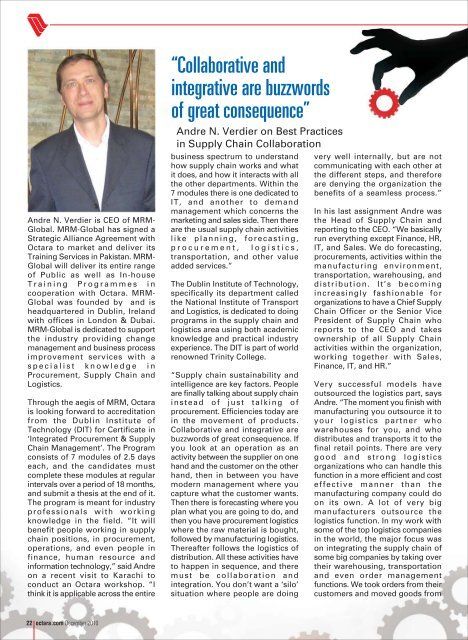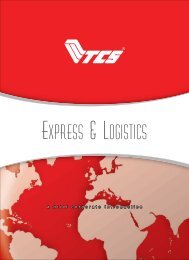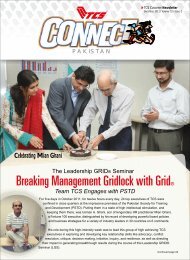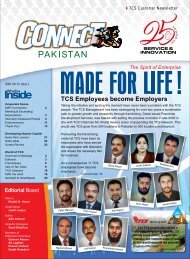PDF Version - TCS Courier
PDF Version - TCS Courier
PDF Version - TCS Courier
You also want an ePaper? Increase the reach of your titles
YUMPU automatically turns print PDFs into web optimized ePapers that Google loves.
Andre N. Verdier is CEO of MRM-<br />
Global. MRM-Global has signed a<br />
Strategic Alliance Agreement with<br />
Octara to market and deliver its<br />
Training Services in Pakistan. MRM-<br />
Global will deliver its entire range<br />
of Public as well as In-house<br />
Training Programmes in<br />
cooperation with Octara. MRM-<br />
Global was founded by and is<br />
headquartered in Dublin, Ireland<br />
with offices in London & Dubai.<br />
MRM-Global is dedicated to support<br />
the industry providing change<br />
management and business process<br />
improvement services with a<br />
specialist knowledge in<br />
Procurement, Supply Chain and<br />
Logistics.<br />
Through the aegis of MRM, Octara<br />
is looking forward to accreditation<br />
from the Dublin Institute of<br />
Technology (DIT) for Certificate in<br />
‘Integrated Procurement & Supply<br />
Chain Management’. The Program<br />
consists of 7 modules of 2.5 days<br />
each, and the candidates must<br />
complete these modules at regular<br />
intervals over a period of 18 months,<br />
and submit a thesis at the end of it.<br />
The program is meant for industry<br />
professionals with working<br />
knowledge in the field. “It will<br />
benefit people working in supply<br />
chain positions, in procurement,<br />
operations, and even people in<br />
finance, human resource and<br />
information technology,” said Andre<br />
on a recent visit to Karachi to<br />
conduct an Octara workshop. “I<br />
think it is applicable across the entire<br />
22 octara.com December 2010<br />
“Collaborative and<br />
integrative are buzzwords<br />
of great consequence”<br />
Andre N. Verdier on Best Practices<br />
in Supply Chain Collaboration<br />
business spectrum to understand<br />
how supply chain works and what<br />
it does, and how it interacts with all<br />
the other departments. Within the<br />
7 modules there is one dedicated to<br />
IT, and another to demand<br />
management which concerns the<br />
marketing and sales side. Then there<br />
are the usual supply chain activities<br />
like planning, forecasting,<br />
procurement, logistics,<br />
transportation, and other value<br />
added services.”<br />
The Dublin Institute of Technology,<br />
specifically its department called<br />
the National Institute of Transport<br />
and Logistics, is dedicated to doing<br />
programs in the supply chain and<br />
logistics area using both academic<br />
knowledge and practical industry<br />
experience. The DIT is part of world<br />
renowned Trinity College.<br />
“Supply chain sustainability and<br />
intelligence are key factors. People<br />
are finally talking about supply chain<br />
instead of just talking of<br />
procurement. Efficiencies today are<br />
in the movement of products.<br />
Collaborative and integrative are<br />
buzzwords of great consequence. If<br />
you look at an operation as an<br />
activity between the supplier on one<br />
hand and the customer on the other<br />
hand, then in between you have<br />
modern management where you<br />
capture what the customer wants.<br />
Then there is forecasting where you<br />
plan what you are going to do, and<br />
then you have procurement logistics<br />
where the raw material is bought,<br />
followed by manufacturing logistics.<br />
Thereafter follows the logistics of<br />
distribution. All these activities have<br />
to happen in sequence, and there<br />
must be collaboration and<br />
integration. You don’t want a ‘silo’<br />
situation where people are doing<br />
very well internally, but are not<br />
communicating with each other at<br />
the different steps, and therefore<br />
are denying the organization the<br />
benefits of a seamless process.”<br />
In his last assignment Andre was<br />
the Head of Supply Chain and<br />
reporting to the CEO. “We basically<br />
run everything except Finance, HR,<br />
IT, and Sales. We do forecasting,<br />
procurements, activities within the<br />
manufacturing environment,<br />
transportation, warehousing, and<br />
distribution. It’s becoming<br />
increasingly fashionable for<br />
organizations to have a Chief Supply<br />
Chain Officer or the Senior Vice<br />
President of Supply Chain who<br />
reports to the CEO and takes<br />
ownership of all Supply Chain<br />
activities within the organization,<br />
working together with Sales,<br />
Finance, IT, and HR.”<br />
Very successful models have<br />
outsourced the logistics part, says<br />
Andre. “The moment you finish with<br />
manufacturing you outsource it to<br />
your logistics partner who<br />
warehouses for you, and who<br />
distributes and transports it to the<br />
final retail points. There are very<br />
good and strong logistics<br />
organizations who can handle this<br />
function in a more efficient and cost<br />
effective manner than the<br />
manufacturing company could do<br />
on its own. A lot of very big<br />
manufacturers outsource the<br />
logistics function. In my work with<br />
some of the top logistics companies<br />
in the world, the major focus was<br />
on integrating the supply chain of<br />
some big companies by taking over<br />
their warehousing, transportation<br />
and even order management<br />
functions. We took orders from their<br />
customers and moved goods from









